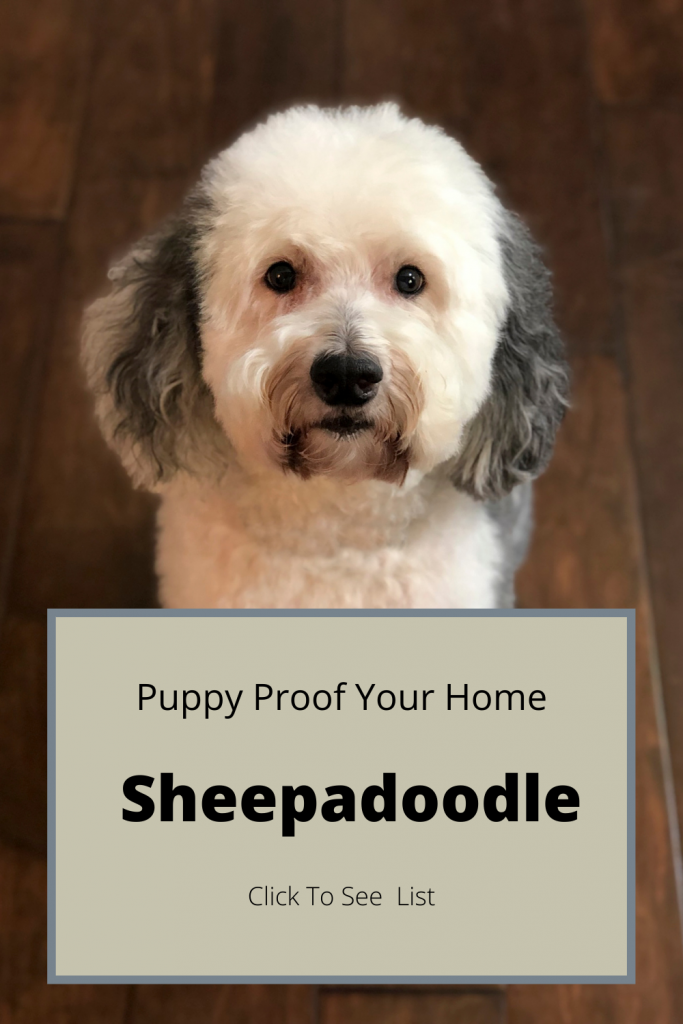
Sheepadoodle puppies are adorable and expensive to adopt so we want them to thrive in our home. Here is a suggested Sheepadoodle Puppy Home Preparation to achieve happy success together. Wishing you a lifetime of love together filled with joyous Sheepadoodle Puppy memories!
Sheepadoodle Puppy Proofing Your Home
Sheepadoodle Puppies are smart, energetic, and have a good sense of smell, thus you will need to keep a careful watch on what they find to put in their mouths. Please check every room, cupboard, garage, car, patio, and backyard space and review them for these items. Please move these items to a much higher secure location with potential safety locks, plus intermittently review these same locations for these dangerous items for your Sheepadoodle puppy.
Please remember Sheepadoodle puppies are intelligent and fast-moving puppies. They will only be exploring their new spaces and tasting everything. They have no knowledge of what is potentially dangerous for them. They are just inquisitive baby animals who want to play, learn, and love you.
Here is a list of items to be sure are not accessible to your Sheepadoo puppy.
Pesticide Products
Most pesticides or insecticides (typically those that come in a spray can) are basic irritants to Sheepadoo puppy and result in clinical signs of drooling, nausea, vomiting, and diarrhea. If your Sheepadoo puppy ingested a pesticide that is not a hydrocarbon, the veterinarian may induce vomiting to help him get rid of the poison. It is important to not use vomiting if your Sheepadoo puppy has consumed hydrocarbons since much damage, such as aspiration into the lungs, can occur. However, many insecticides used in homes, gardens, parks, and even spot-on flea treatments can easily poison your Sheepadoo puppy if not used carefully. Your Sheepadoo puppy is especially at risk of inhaling or ingesting debris left on the grass, eating a treated plant, or eating an undissolved pellet of water-soluble insecticide. A 2013 study showed that lawn chemicals remain on sprayed surfaces for at least 48 hours after application. So, to be safe, you really shouldn’t allow your Sheepadoo puppy (or children) on a chemically-treated lawn for at least 3 days after it’s been sprayed.
Pesticide Products
- Home insect products
- Mothballs
- Rat, Mouse, Slug and Snail bait
Over the Counter Medicines & Prescription Medicine
While these medications are safe for people, even one or two pills can cause serious harm to your Sheepadoo puppy. Your beloved pet may develop serious stomach and intestinal ulcers as well as kidney failure. Ibuprofen and acetaminophen are two of the most common pet poisons — which is why on any list of “do-not-give-your-pet” Over The Counter medications, No. 1 is always pain medications. I hope the day comes, and soon, when every Sheepadoodle puppy lover knows that acetaminophen can be deadly to dogs. Alas, my emergency care colleagues tell me we’re far from that universal knowledge. Even less widely known: Acetaminophen is also toxic to puppies. The same is true for ibuprofen.
Never give any over-the-counter pain medication to your pet. Even aspirin, once widely recommended by veterinarians for mild pain in dogs, is now on the “do not give” list after the discovery that even this “safe” product causes gastrointestinal ulcerations. Pain management is very important in pets, but don’t take matters into your own hands: Talk to your veterinarian about which prescription medication (or combinations of medications) will best ease your pet’s suffering safely. (Related: Pepto-Bismol contains bismuth salicylate, which is similar to aspirin and can cause similar problems in dogs.)
Over the Counter Medicines & Prescription Medicine
- Anti-inflammatory medications (aspirin, ibuprofen, etc)
- Acetaminophen
- Any prescription medications
Artificial Sweetened Treats
Xylitol
commonly found in sugar-free candy, baked goods, gum, and other products, can lead to a life-threatening drop in blood sugar and kidney failure in Sheepadoo puppy. Xylitol is NOT to be consumed by Sheepadoodle puppy in any amount. It is not only dangerous but has been proven to be fatal. Family pets are exposed to a wide variety of foods, and sometimes accidents may happen. Xylitol, this naturally produced sweetener is found in many “sugar-free” items such as ice cream, candies, pastries, gums, yogurts, juices and more. Xylitol is HIGHLY TOXIC and potentially fatal if consumed. Even in small doses, it can cause seizures, liver failure, and death. Always be extra careful about what goes in your dog’s mouth, and have a contingency plan prepared in case of emergency. Xylitol is found naturally and is commonly extracted from birch or corn cobs to be used as a sweetener in commercial products like gum, candy, baked goods and toothpaste. Although well tolerated in humans, the sugar substitute xylitol can be poisonous to Sheepadoodle puppy. When swallowed by canines, xylitol absorption is rapid. Vomiting can be seen in only 30 minutes, but full symptoms can be delayed for up to 12 hours. In Sheepadoodle puppy, xylitol stimulates insulin secretion and can lead to profoundly low blood sugar; this causes weakness and loss of coordination. If left untreated, the Sheepadoodle puppy may eventually develop seizures or collapse. With large ingestions xylitol has also been linked to liver failure in Sheepadoodle puppies.
Erythritol
Erythritol in large quantities, can cause Sheepadoodle puppy gastrointestinal symptoms.
Stevia (green packet)
This is a naturally produced sweetener from the stevia plant. Stevia in large quantities, it can cause diarrhea in Sheepadoodle puppy.
Aspartame (blue packet)
There are no serious health effects aside from minor gastrointestinal problems. That being said, it is in no way a healthy product for Sheepadoodle puppy to consume.
Saccharin (pink packet)
Saccharin can cause gastrointestinal issues on Sheepadoodle puppy, and long-term effects have not yet been tested.
Sucralose (yellow packet)
Sucralose can cause diarrhea in Sheepadoodle puppy.
Artificial Sweetened Treats
- Sugarless chewing gum –
The artificial sweeteners are toxic to Sheepadoodle puppy
- Sugarless candy-
The artificial sweeteners are toxic to Sheepadoodle puppy
- Sugarless soda
The artificial sweeteners are toxic to Sheepadoodle puppy
- Sugarless cookies, crackers,cake & ice cream
The artificial sweeteners are toxic to Sheepadoodle puppy
Vitamins
If consumed in large enough amounts, any human-grade vitamin may represent a threat to a Sheepadoodle puppy’s health. In the United States an estimated 52% of people take dietary supplements and 31% take a daily multivitamin/mineral—and that means a lot of potential pet exposures.
In addition, the American Poison Control Center reports that more potent supplements are becoming widely available to address an increased concern for Vitamin D deficiency in humans, so veterinarians are encountering more Vitamin D toxicosis in companion Sheepadoodles.
Multivitamin Components
Multivitamins are grouped into the over-the-counter classification, and for the past two years OTC items have been either first or second on the top 10 list of exposures. Most common ingredients include:
- Vitamin C
- B1
- B2
- B3
- B5
- B6
- B9
- B12
- Biotin
- Vitamin A
- Vitamin E
- Vitamin D
- Vitamin K
- Potassium
- Iodine
- Selenium
- Borate
- Zinc
- Calcium
- Magnesium
- Manganese
- Molybdenum
- Beta carotene
- Iron
While just about anything can be a problem if ingested in the right quantities, typically iron and vitamin D are the most potently dangerous for your Sheepadoodle puppy and are most likely to potentially cause issues.
Some supplements contain extra ingredients on top of the normal list, and they can create problems for pets who ingest them. They include:
- 5 hydroxytryptophan (5 HTP)
- Caffeine (guarana, green tea)
- Citrus aurantium (synephrine)
- Ephedra (ma huang)
- Fluoride
- Yohimbine
- Xylitol
Caffeine, citrus aurantium, ephedra and yohimbine are all stimulants that affect the nervous and cardiovascular system. Signs such as hyperactivity, agitation, tachycardia, hypo- or hypertension and hyperthermia are common concerns.
These ingredients can be synergistic, so if a product has more than one of these ingredients, you can expect signs to be more severe than if it contains just one.
5 hydroxytryptophan is a serotonin precursor. When ingested it will be converted into serotonin and can affect the nervous, cardiovascular and gastrointestinal systems. Common signs include vomiting, drooling, depression or hyperactivity, vocalization, tachycardia, hypertension and hyperthermia. Serotonin syndrome is also possible.
Fluoride is more often found in children’s vitamins and most often results in gastrointestinal signs like vomiting and diarrhea. However, if ingested in larger amounts it may cause hypocalcemia, hypomagnesemia and hyperkalemia. In severe cases hypotension and cardiac arrhythmias may develop in Sheepadoodle Puppy.
Laundry
An item that doesn’t often show up on lists of household products toxic to pets is laundry detergent. But it should, because most detergents and soaps contain ionic and anionic surfactants. When ingested in small amounts, these chemicals can cause GI upset in a pet, such as excessive drooling, vomiting or diarrhea.Most of us have laundry detergent in our homes. We need it to keep our clothes, bedding and towels clean. If your fur baby chooses to ingest laundry detergent, it can cause some serious health issues.
This used to be a somewhat rare health issue. These days, however, soap “pods” have caused an increase in the problem over the last few years. Experts speculate that the pods resemble toys, and this attracts the Sheepadoodle puppy. If the dog pierces the outer membrane of the pod, he may easily swallow the detergent inside.
No matter if the laundry detergent is in a pod, liquid or powder form, it can still be poisonous to your Sheepadoodle puppy. This is due to the ingredients in the soap. Detergents can contain ingredients that irritate and cause a Sheepadoodle puppy to vomit, have diarrhea, or suffer from chemical burns in the mouth and esophagus.
Another issue is that detergent, when it meets liquid, becomes foamy. This can happen when a detergent meets the liquid in your Sheepadoodle puppy’s digestive tract. If your fur baby develops foam after ingesting detergent, and then vomits, the foam can be inhaled into the lungs. If this happens, the soap covers the airways, and doesn’t allow oxygen exchange, which can cause your Sheepadoodle puppy companion to suffocate.
Poisoning occurs if the Sheepadoodle puppy eats a small or large quantity of the detergent. It can also cause problems with his nose, eyes, skin, paws, and the digestive tract.
Symptoms of Laundry Detergent Poisoning in Sheepadoodle Puppy
This is not an exhaustive list, but your puppy could show any of the signs below after ingesting detergent:
- Vomiting
- Diarrhea
- Gastrointestinal lesions
- Lack of appetite
- Swollen abdomen
- Burns/lesions in mouth (also around eyes, nose, outside his mouth)
- Excessive drooling
- Disorientation
- Muscle weakness/seizures
- Collapse
- Hair loss
- Coughing
- Difficulty breathing
- Inflammation of lung tissue
Laundry
- Fabric softener sheets
- Laundry detergent packets
- Dishwashing detergent powder and packets
- Disinfectants and bleach
Stationary
Pencils and pens ( Impaling & Choking Hazard)
BBQ Products
When a Sheepadoo puppy chews on lighters, they have the risk of ingesting the liquid or inhaling the butane as it is discharged from the lighter. Butane inhalation has been associated with several problems including death. A common problem associated with ingestion is burning of the mouth, throat, esophagus and stomach
BBQ Products
- Lighter fluid & lighters
Tobacco & Alcohol
Luckily for Sheepadoodle puppies, tobacco tastes terrible. Even chewing tobacco must have flavorings added to make it something worthy of oral enjoyment. Still, cigarettes have plenty of nicotine and even a small cigarette butt can mean serious illness or even death for a Sheepadoodle puppy. Just like chocolate and onions, alcohol is toxic to Sheepadoodle. Even small amounts of alcohol — not only in drinks but also in syrups and raw bread dough — can have ingredients that are poisonous for Sheepadoodle puppy
Tobacco & Alcohol
- Tobacco products
- Alcoholic beverages
Cat Food & Cat Litter Box & Animal Feces
- Cat litter box and other animal feces
- Cat food
Human Toothpaste
Dangerous sweeteners such as Xylitol are found in many non-food items such as mouthwash, chewing gum, and toothpaste.
- Toothpaste & Mouthwash
Harmful Human Foods
- Grapes & raisins
- Avocados
- Onions
- Garlic
- Chocolate in all forms
- Gum, candy, or foods sweetened with xylitol
- Salt
- Moldy or spoiled foods
- Raw yeast dough
Some objects that you should be sure are up and out of reach due to choking hazards for your Sheepadoodle puppy include:
- Buttons and any small hard objects i.e. nails, needles, scissors etc
- Bread twisty ties and plastic wrap
- Coins
- Balls that are too small, or have a smooth coating
- Cotton swabs, dental floss, string, yarn
- Human hair ties, hair pins and rubber bands
We hope these Sheepadoodle puppy proofing suggestions will help you prepare and enjoy welcoming your affectionate and adorable puppy! We wish you many happy ever after memories together.

